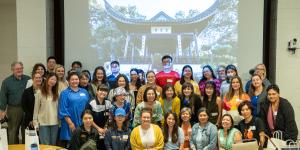On September 29, 2024, the USC U.S.-China Institute hosted a workshop at the Huntington’s Chinese garden, offering K-12 educators hands-on insights into using the garden as a teaching tool. With expert presentations, a guided tour, and new resources, the event explored how Chinese gardens' rich history and cultural significance can be integrated into classrooms. Interested in learning more? Click below for details on the workshop and upcoming programs for educators.
Two Classics of Asian Cinema A City of Sadness (Bei qing cheng shi)
Hou Hsiao-hsien's landmark epic uses the story of a single family to reflect the most chaotic period in Taiwan's history.
Where

A City of Sadness (Bei qing cheng shi)
New twentieth-anniversary 35mm print courtesy of the Taipei Economic and Cultural Office,
The first ever Chinese-language film to win the Golden Lion at the Venice film festival, Hou Hsiao-hsien’s landmark epic uses the story of a single family to reflect the most chaotic period in Taiwan’s history: four years that witness the end of Japanese occupation, mass migrations from the mainland, and the rise of martial law. With its rapt camerawork and spellbinding mise-en-scène, A City of Sadness masterfully contrasts the clashes of the gangster underworld with the clandestine struggles of the independence movement. The film officially broke four decades’ silence on the country’s transition into dictatorship, particularly the fateful uprising of February 28 1947. It also gained sudden, inadvertent poignancy by being released in the wake of the Tiananmen Square massacre. “As always with Hou, the human dimension is paramount…given the panoramic sweep, Hou turns in a masterpiece of small gestures and massive resonance.”—Time Out. 1989/color/157 min. | Scr: Wu Nianzhen, Zhu Tianwen; dir: Hou Hsiao-hsien; w/ Tony Leung, Hsin Shu-fen, Chen Sown-yung.
Featured Articles
Happy Lunar New Year from the USC US-China Institute!
Events
Ying Zhu looks at new developments for Chinese and global streaming services.
David Zweig examines China's talent recruitment efforts, particularly towards those scientists and engineers who left China for further study. U.S. universities, labs and companies have long brought in talent from China. Are such people still welcome?






